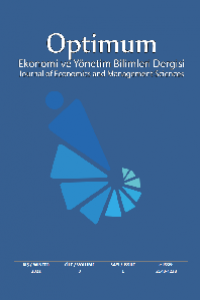The Relationships among Corporate Social Responsibility, Moral Degradation and Intrinsic Motivation in Transition Economies
Abstract
The aim of this study is to examine corporate social responsibility perception, moral degradation perception and intrinsic motivation of employees in transition economies and to determine whether perceptions of social responsibility and moral degradation have an impact on intrinsic motivation. It is also investigated whether moral degradation perception in business life has a moderating effect in the relationship between corporate social responsibility and intrinsic motivation. The population of the study consist of 193 employees of a public hospital in Turkmenabat. 140 people were selected using simple random sampling method. Data were collected through question forms and analyzed with IBM SPSS 25. It was found that the higher the corporate social responsibility perception the higher intrinsic motivation. It was also found that the higher moral degradation perception, the lower intrinsic motivation. Besides, as the moral degradation perception strengthens, the positive impact of social responsibility on intrinsic motivation strengthens as well.
References
- Carroll, A. B. (2004). Managing ethically with global stakeholders: a present and future challenge. Academy of Management Executive, 18 (2), 114-120.
- Çalışkan, O. & Ünüsan, Ç. (2011). Otel çalışanlarının kurumsal sosyal sorumluluk algısının iş tatmini ve işte kalma niyetine etkisi. Turizm Araştırmaları Dergisi, 22 (2), 154-166.
- Demir, S. & Karakuş, M. (2015). The relationship between ethical climate and trust and motivation levels of teachers and students. Kuram ve Uygulamada Eğitim Yönetimi, 21 (2), 183-212.
- Forsgren, A., & Haskell, L. (2015). The impact of corporate social responsibility on intrinsic and extrinsic employee motivation: a mixed-method study of Sodexo. Degree Project, Umea School of Business and Economics, Sweden.
- Hough,C., Green, K. & Plumlee, G. (2016). Impact of ethics environment and organizational trust on employee engagement. Journal of Legal, Ethical and Regulatory Issues, 18, 45-62.
- Lu, C. J., Shih, Y. Y. & Wang, S. T. (2016, 6-8 July). The effect of corporate social responsibility initiatives on internal employee motivation and organizational identification, 10th International Conference on Innovative Mobile and Internet Services in Ubiquitous Computing (IMIS), Fukuoka, Japan, doi: 10.1109/IMIS.2016.85.
- Nanderam, D.R. (2010). Corporate social responsibility and employee engagement: an exploratory case study. Unpublished doctoral dissertation, Capella University, USA.
- Valentine, S., Fleischman, G. (2008). Ethics programs, perceived corporate social responsibility and job satisfaction. Journal of Business Ethics, 77 (2), 159-172.
- Wong, S. C. & Li, J. S. (2015). Will hotel employees’ perception of unethical managerial behavior affect their job satisfaction? a study of Chinese hotel employees in China. International Journal of Contemporary Hospitality Management, 27(5), 853-877.
- Zheng, Q., Luo, Y., Wang, S. (2014). Moral degradation, business ethics, and corporate social responsibility in a transitional economy. Journal of Business Ethics, 120, 405–421.
Geçiş Ekonomilerinde Kurumsal Sosyal Sorumluluk, Ahlaki Bozulma ve İçsel Motivasyon Arasındaki İlişkiler
Abstract
Bu çalışmanın amacı, geçiş ekonomilerinde çalışanların kurumsal sosyal sorumluluk algısını, iş hayatında ahlaki bozulma algısını ve içsel motivasyon düzeylerini incelemek, ahlaki bozulma ve sosyal sorumluluk algılarının içsel motivasyonları üzerinde etkili olup olmadığını belirlemektir. Çalışanların ahlaki bozulma algısının kurumsal sosyal sorumluluk ile içsel motivasyon düzeyi arasındaki ilişkide biçimlendirici (düzenleyici) rolünün bulunup bulunmadığı da araştırılmaktadır. Araştırmanın ana kütlesini Türkmenistan’ın Türkmenabat şehrinde bulunan bir devlet hastanesinde faaliyet gösteren 193 çalışan oluşturmaktadır. Bu ana kütleden %95 güven düzeyinde %5 hata payı ile seçilen 129 çalışan araştırmanın örneklemini oluşturmaktadır. Yeterli örneklem büyüklüğüne ulaşmak amacıyla basit tesadüfi örnekleme yöntemiyle toplam 140 kişiye anket uygulanmış ve veriler toplanmıştır. Soru formlarıyla toplanan veriler IBM SPSS 25. programı ile analiz edilmiştir. Yapılan analizlerle çalışanın kurumsal sosyal sorumluluk algısı arttıkça içsel motivasyonunun arttığı, ahlaki bozulma algısı arttıkça içsel motivasyonunun düştüğü bulunmuştur. Ayrıca çalışanların ahlaki bozulma algısı arttıkça kurumsal sosyal sorumluluk ile içsel motivasyon düzeyi arasındaki ilişkinin güçlendiği tespit edilmiştir.
References
- Carroll, A. B. (2004). Managing ethically with global stakeholders: a present and future challenge. Academy of Management Executive, 18 (2), 114-120.
- Çalışkan, O. & Ünüsan, Ç. (2011). Otel çalışanlarının kurumsal sosyal sorumluluk algısının iş tatmini ve işte kalma niyetine etkisi. Turizm Araştırmaları Dergisi, 22 (2), 154-166.
- Demir, S. & Karakuş, M. (2015). The relationship between ethical climate and trust and motivation levels of teachers and students. Kuram ve Uygulamada Eğitim Yönetimi, 21 (2), 183-212.
- Forsgren, A., & Haskell, L. (2015). The impact of corporate social responsibility on intrinsic and extrinsic employee motivation: a mixed-method study of Sodexo. Degree Project, Umea School of Business and Economics, Sweden.
- Hough,C., Green, K. & Plumlee, G. (2016). Impact of ethics environment and organizational trust on employee engagement. Journal of Legal, Ethical and Regulatory Issues, 18, 45-62.
- Lu, C. J., Shih, Y. Y. & Wang, S. T. (2016, 6-8 July). The effect of corporate social responsibility initiatives on internal employee motivation and organizational identification, 10th International Conference on Innovative Mobile and Internet Services in Ubiquitous Computing (IMIS), Fukuoka, Japan, doi: 10.1109/IMIS.2016.85.
- Nanderam, D.R. (2010). Corporate social responsibility and employee engagement: an exploratory case study. Unpublished doctoral dissertation, Capella University, USA.
- Valentine, S., Fleischman, G. (2008). Ethics programs, perceived corporate social responsibility and job satisfaction. Journal of Business Ethics, 77 (2), 159-172.
- Wong, S. C. & Li, J. S. (2015). Will hotel employees’ perception of unethical managerial behavior affect their job satisfaction? a study of Chinese hotel employees in China. International Journal of Contemporary Hospitality Management, 27(5), 853-877.
- Zheng, Q., Luo, Y., Wang, S. (2014). Moral degradation, business ethics, and corporate social responsibility in a transitional economy. Journal of Business Ethics, 120, 405–421.
Details
| Primary Language | Turkish |
|---|---|
| Subjects | Business Administration |
| Journal Section | Articles |
| Authors | |
| Publication Date | January 1, 2022 |
| Submission Date | July 12, 2021 |
| Published in Issue | Year 2022 Volume: 9 Issue: 1 |
Cite
Please click for the statistics of Google Scholar.


